Talk to a Registered Dietitian and use INSIDER20 for 20% off!
Talk to a real Dietitian for only $99: Schedule Now
This post contains links through which we may earn a small commission should you make a purchase from a brand. This in no way affects our ability to objectively critique the products and brands we review.
Evidence Based Research To fulfill our commitment to bringing our audience accurate and insightful content, our expert writers and medical reviewers rely on carefully curated research.
Read Our Editorial Policy
Although snacktime may seem like it should be saved for recess, having healthy snacks throughout the day is also important for adults—especially for people with diabetes, who are prone to dramatic blood sugar dips and rises.
Instead of binging on snacks like chips or pretzels that can cause a blood sugar spike, consider adding higher-protein, lower-carb snacks to your daily routine—like these 15 options, which are some of the best snacks for diabetes you can make in just minutes.
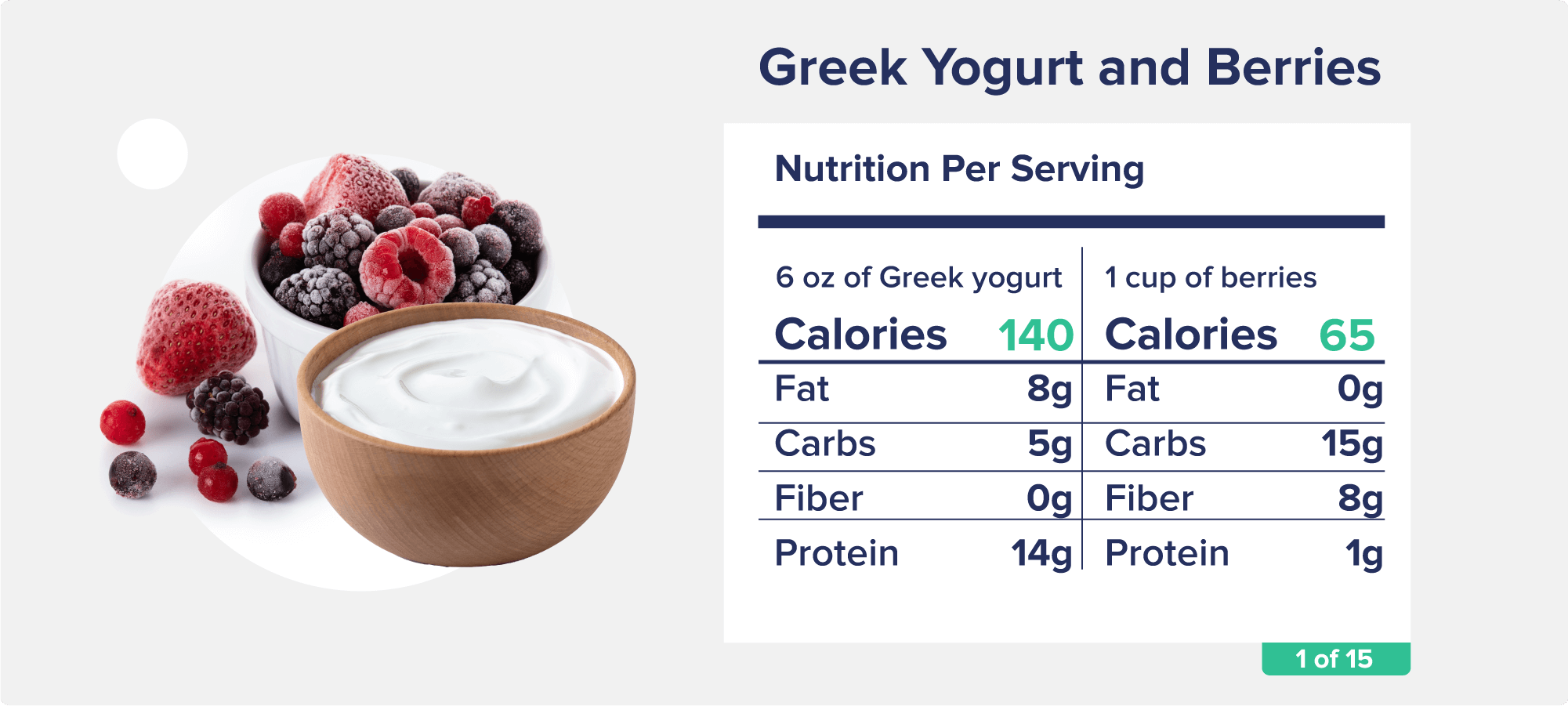
Greek yogurt is extremely high in protein per ounce, making it a great snack option for people with diabetes.
If you want a more filling snack, opt for full-fat Greek yogurt, but if you’d like to keep the calorie count lower, you can choose non-fat.
Yogurt is also an excellent source of calcium and contains probiotics—healthy bacteria that can populate the microbiome and benefit gut health.
Keep in mind that you’ll need to choose unflavored Greek yogurt to keep the sugar levels of this snack low.
While you can certainly eat Greek yogurt on its own, many people enjoy adding berries to their bowl for a touch of natural sweetness.
The lowest-sugar berries are blueberries and raspberries, and both provide high levels of fiber and polyphenol compounds called anthocyanins that reduce inflammation and can benefit people with diabetes.
Nutrition Per Serving:
6 oz of full-fat Greek yogurt: 140 calories, 8g fat, 5g carbs, 0g fiber, 14g protein
1 cup of berries: Approximately 65 calories, 0g fat, 15g carbs, 8g fiber, 1g protein
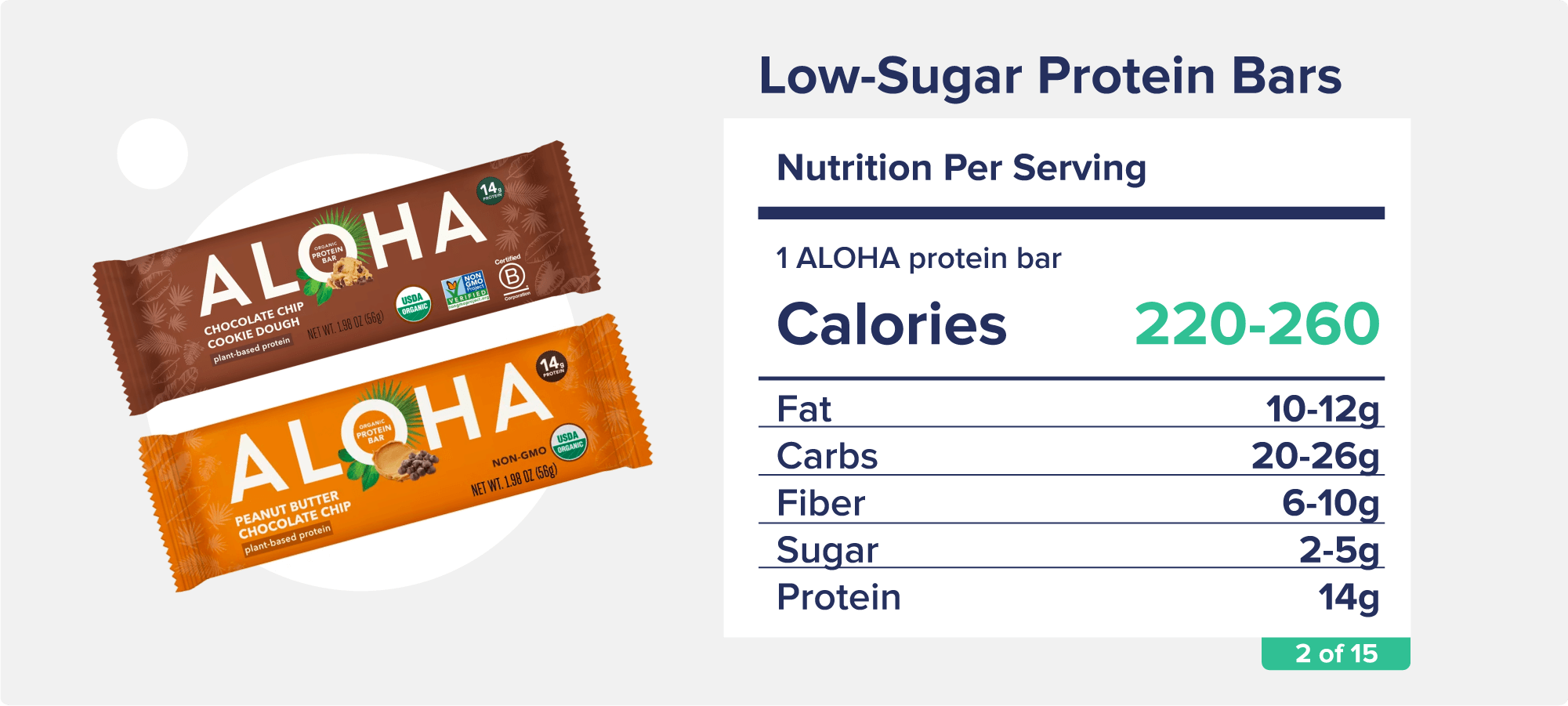
Not all protein bars are created equal—many on the market are loaded with sugar or artificial sweeteners that aren’t great for diabetics.
One of our favorite low-sugar protein bars is ALOHA, which is loaded with plant-based protein and fiber but lower in sugar than most others.
Each ALOHA bar contains a base of:
While they have dozens of tasty flavors to choose from, we love the Chocolate Chip Cookie Dough, Peanut Butter Chocolate Chip, and Lemon Cashew.
Nutrition Per Serving:
1 ALOHA protein bar: 220-260 calories, 10-12g fat, 20-26g carbs, 6-10g fiber, 2-5g sugar, 14g protein
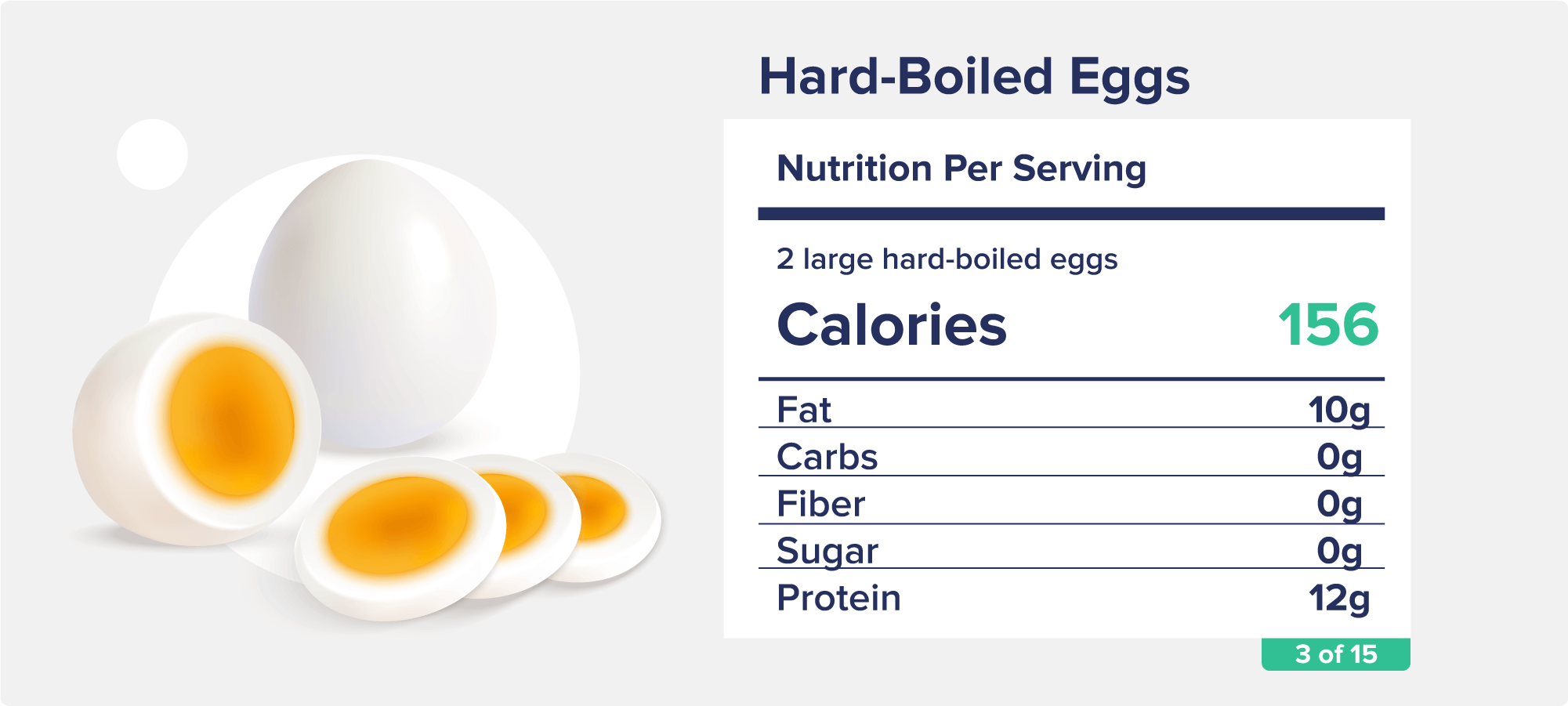
Eggs are a perfect package of protein, healthy fats, and vitamins with zero carbs or sugar, making them the ideal snack for people with diabetes who want to keep their blood sugar levels stable.
Even if you fell victim to the low-fat, egg-whites-only craze of the 90s and 00s, it’s time to embrace the yolk—although the protein is in the whites, the yolks contain essential nutrients like healthy fats, vitamin D, and choline.
You can eat hard-boiled eggs plain, add salt and pepper, a dash of soy sauce, or top with hot sauce.
Plus, many grocery stores sell pre-made hard-boiled eggs to simplify snack time if you’re in a time crunch—we love Vital Farms’ pasture-raised eggs.
Nutrition Per Serving:
2 large hard-boiled eggs: 156 calories, 10g fat, 0g carbs, 0g fiber, 0g sugar, 12g protein
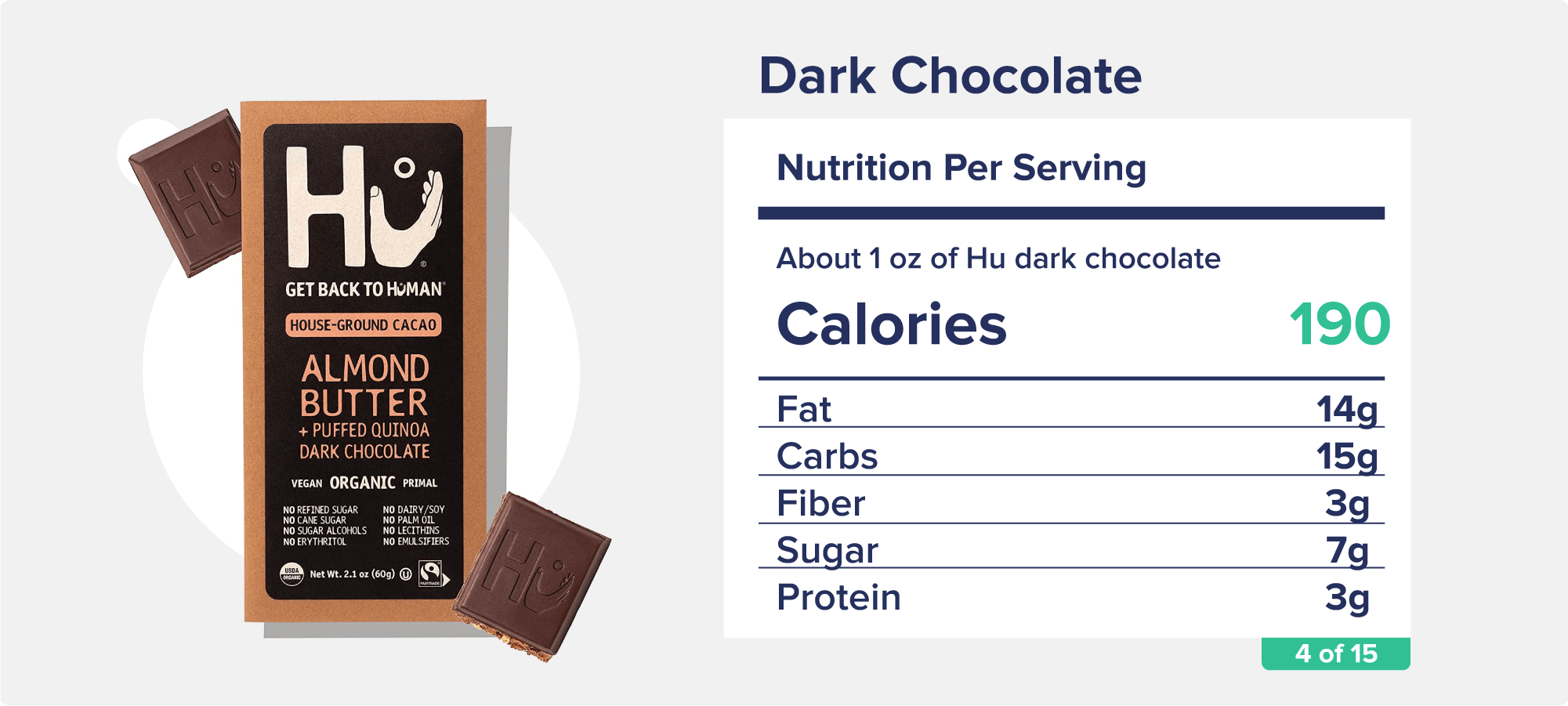
If you have diabetes or dysregulated blood sugar, you might have thought that you can never have desserts like chocolate again—but dark chocolate is the dessert where your blood sugar makes an exception.
Dark chocolate is much lower in sugar than milk chocolate, and it also contains flavanol antioxidants that research shows may help to lower blood sugar or slow the progression of type 2 diabetes.
One of our favorite healthy dark chocolate brands is Hu, which has Simple Dark Chocolate Bars that have only 7g of sugar per half-bar serving—and you’ll even get a little bit of fiber and protein (3g each).
Another healthy sweet snack much loved at The Nutrition Insider is Honey Mama’s—decadent yet low-sugar cocoa truffle bars (only 7g per serving from organic raw honey) with a dozen delicious and unique flavors.
Nutrition Per Serving:
About 1oz of Hu dark chocolate: 190 calories, 14g fat, 15g carbs, 3g fiber, 7g sugar, 3g protein
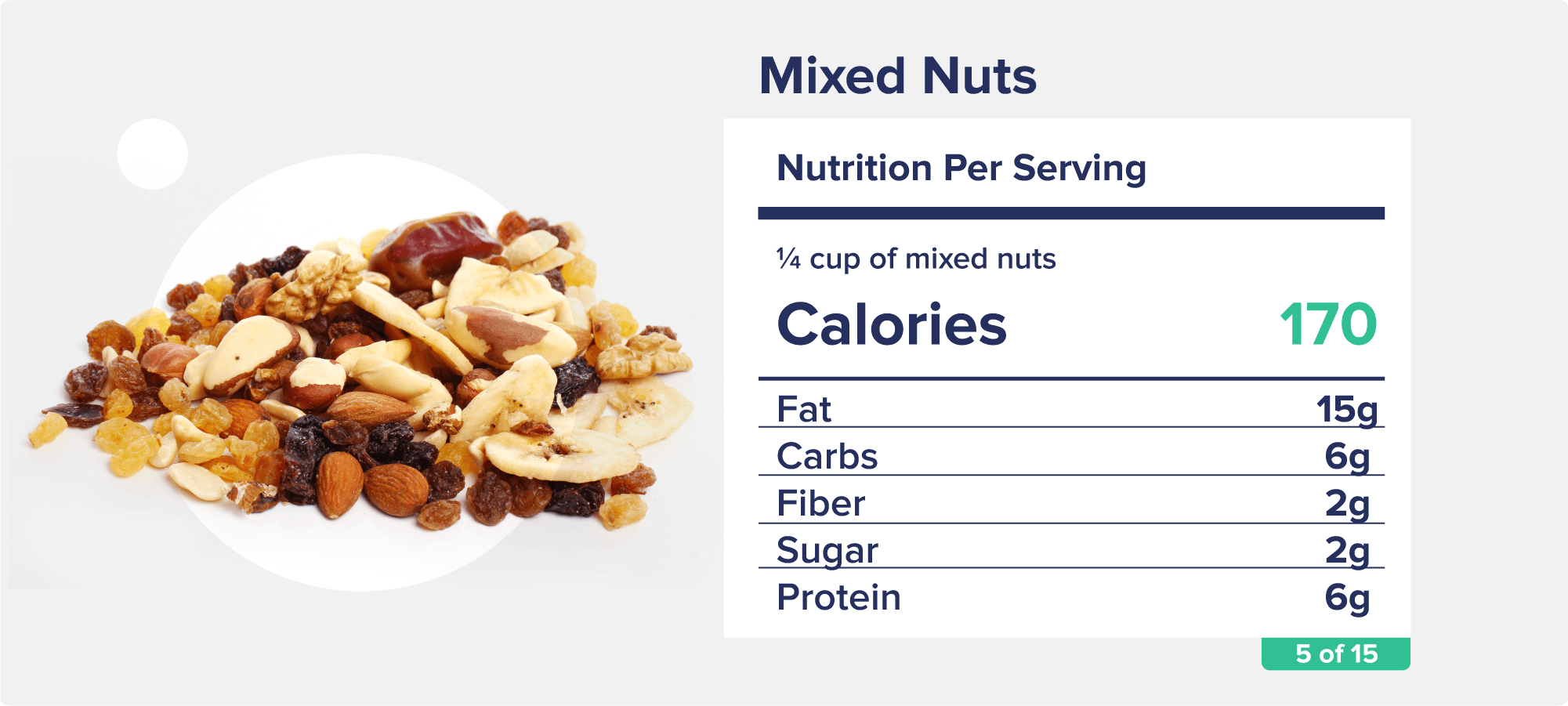
Nuts are high in monounsaturated fat, vitamin E, magnesium, and selenium, making them a great healthy snack for diabetics.
Although nuts are high in calories and fat, research shows that moderate nut consumption can increase satiety, lower inflammation, and reduce the risk of developing heart disease or obesity, which can often coincide with type 2 diabetes.
A review from 2019 also concluded that eating more tree nuts was linked to lower fasting insulin levels and reduced insulin resistance, both of which are dysregulated in diabetics.
While all nuts are healthy, some are higher in carbohydrates than others. Here’s a ranking of the net carbs (total carbs minus fiber) per 100g (3.5 oz—a big portion) of some commonly consumed nuts:
However, this doesn’t mean you can’t eat nuts that are higher in net carbs—rather, be mindful of portion sizes and stick to 1oz (about ¼ cup) to control your blood sugar levels.
Nutrition Per Serving:
¼ cup of mixed nuts: Approximately 170 calories, 15g fat, 6g carbs, 2g fiber, 6g protein
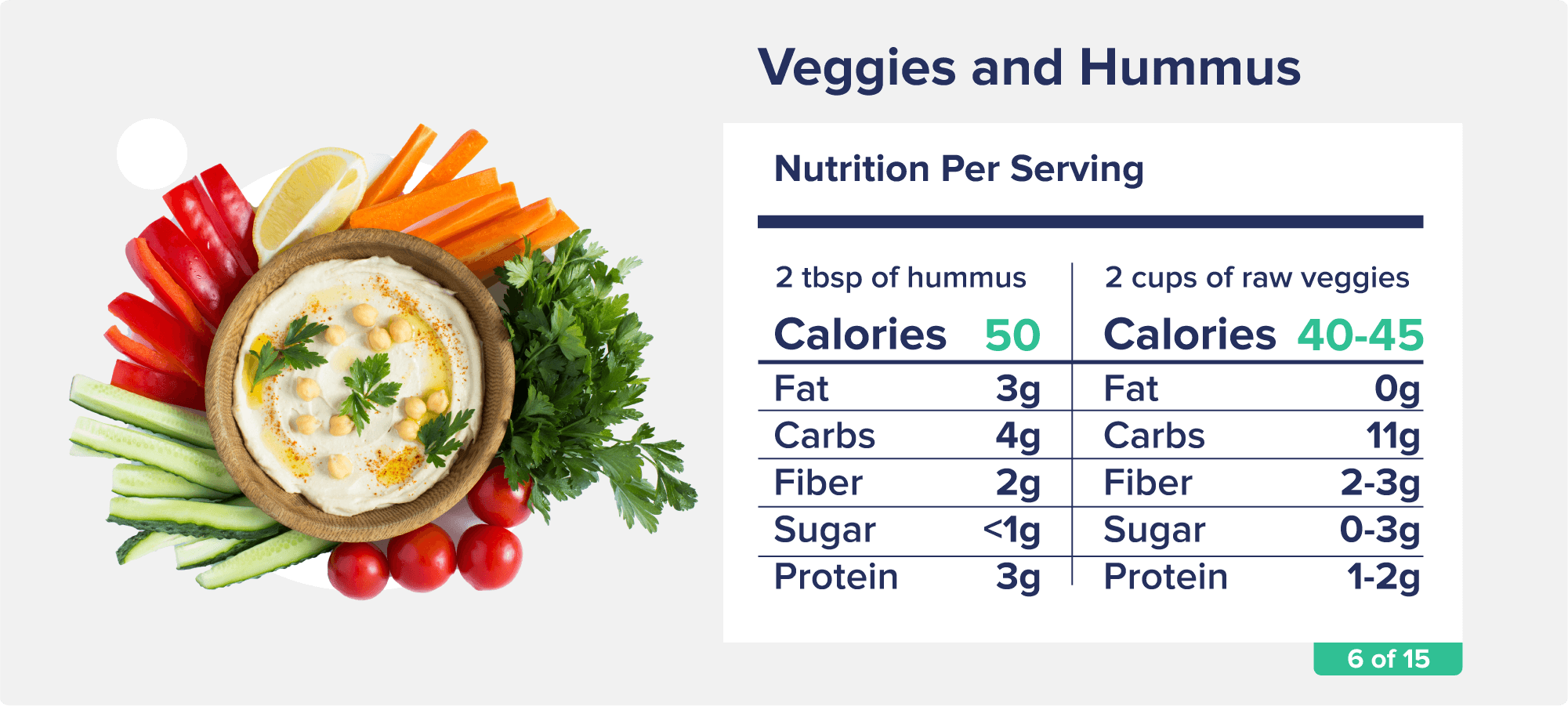
Hummus is a common spread in Mediterranean and Middle Eastern cuisine, typically made from chickpeas (garbanzo beans), tahini (sesame seed paste), olive oil, garlic, and herbs or spices.
This hearty dip is rich in fiber, healthy fats, and protein, making it perfect for a diabetic snack.
While you can buy hummus in most grocery stores, you can also easily make it home—try our Homemade Hummus recipe here.
To stick with the Mediterranean theme, pair 2 tablespoons of hummus with 1-2 cups of sliced cucumbers, which are water-loaded veggies that can help improve hydration in people with diabetes.
If you’re not a fan of cucumbers, try dipping baby carrots, carrot sticks, celery sticks, sliced bell peppers, or sliced radishes into your hummus.
Nutrition Per Serving:
2 Tbsp of hummus: 50 calories, 3g fat, 4g carbs, 2g fiber, <1g sugar, 3g protein
2 cups of raw veggies: 40-45 calories, 0g fat, 11g carbs, 2-3g fiber, 0-3g sugar, 1-2g protein
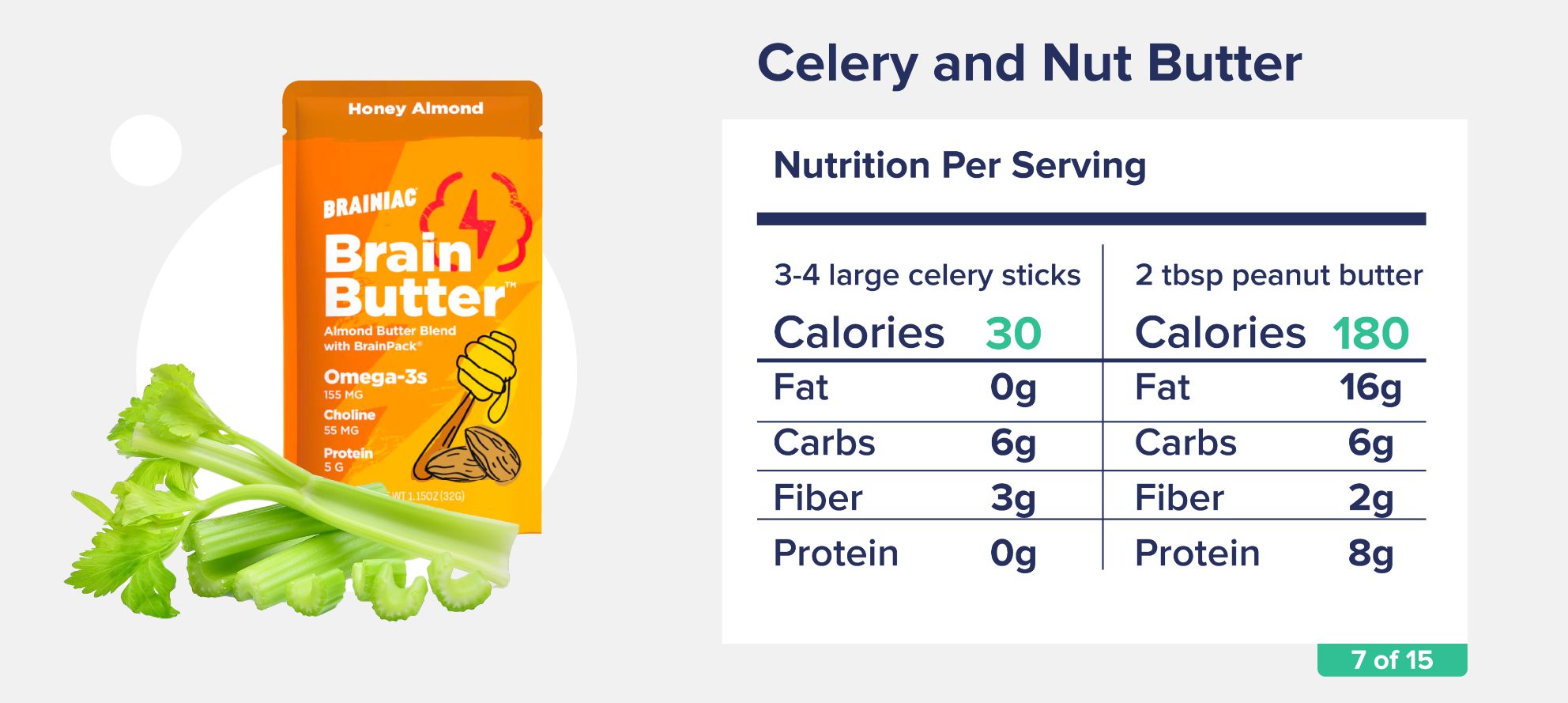
Celery is a low-calorie food with antioxidant and anti-inflammatory properties, making it a worthwhile snack for people with type 2 diabetes.
Plus, celery contains lots of water and fiber, which helps with digestion and increasing fullness.
Spreading crunchy celery sticks with creamy peanut or almond butter is a classic way to enjoy the vegetable.
We especially love nut butters that pack an additional nutrition punch—like Brainiac, who loads their delicious flavored almond butters with brain-boosting and heart-healthy omega-3 fats and choline.
If you want to be transported back to childhood, throw just a few raisins on there (not too many!) for a classic “ants on a log” snack.
Nutrition Per Serving:
3-4 large celery sticks: 30 calories, 0g fat, 6g carbs, 3g fiber, 0g protein
2 Tbsp peanut butter: 180 calories, 16g fat, 6g carbs, 2g fiber, 8g protein
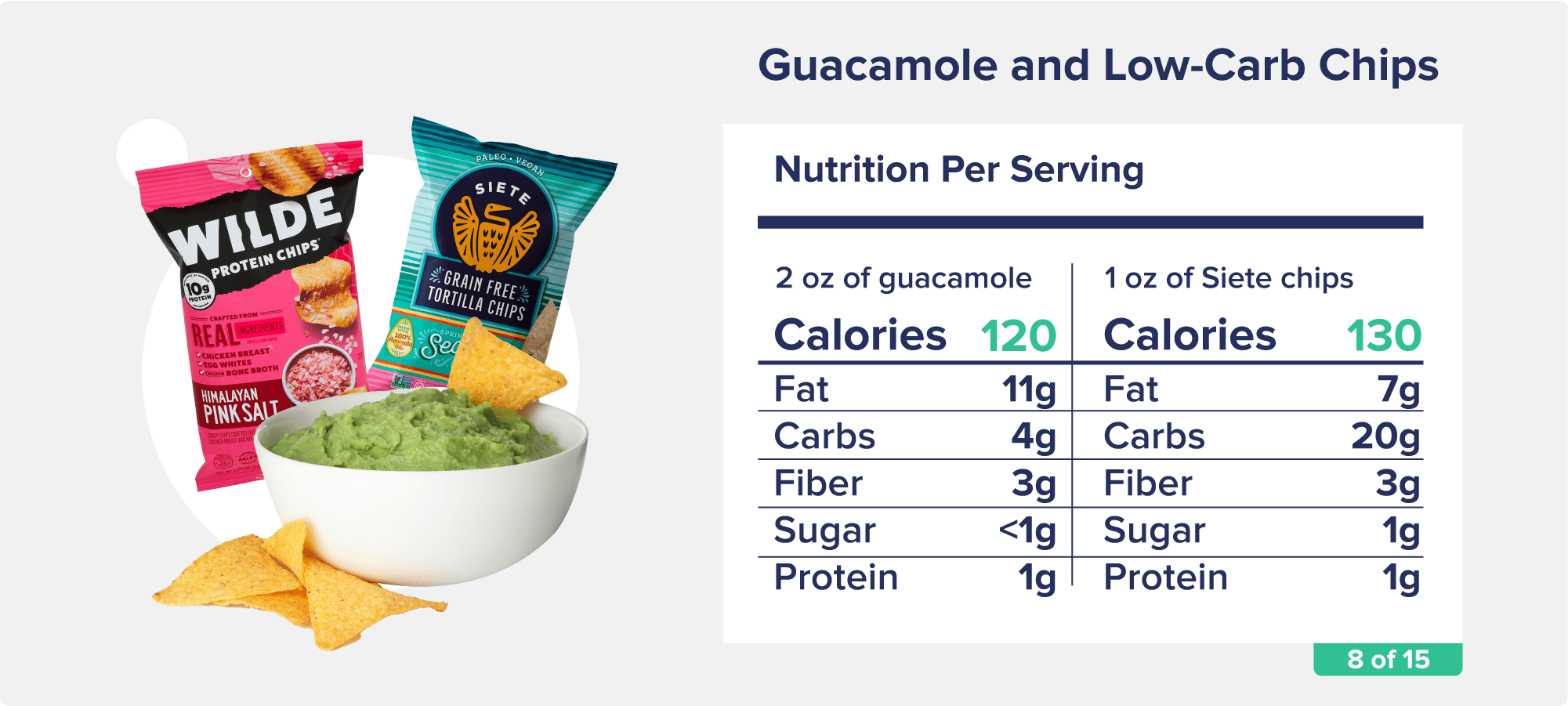
Guacamole is an avocado-based dip rich in healthy fats, fiber, vitamin C, and potassium.
Although avocados are high in fat, the prominent type is monounsaturated fat—a heart-healthy form of fat that protects against metabolic disorders like type 2 diabetes and heart disease.
In addition to avocado, guacamole can contain onion, lime juice, tomato, garlic, or cilantro—all rich in antioxidants and blood sugar friendly.
While tortilla chips are the most common dipping device for guac, some chips are healthier than others.
We love the cassava-based chips from Siete or Wilde Chicken Chips if you want to pack a huge protein punch.
Nutrition Per Serving:
2oz guacamole: 120 calories, 11g fat, 4g carbs, 3g fiber, <1g sugar, 1g protein
1oz of Siete Chips: 130 calories, 7g fat, 20g carbs, 3g fiber, 1g sugar, 1g protein
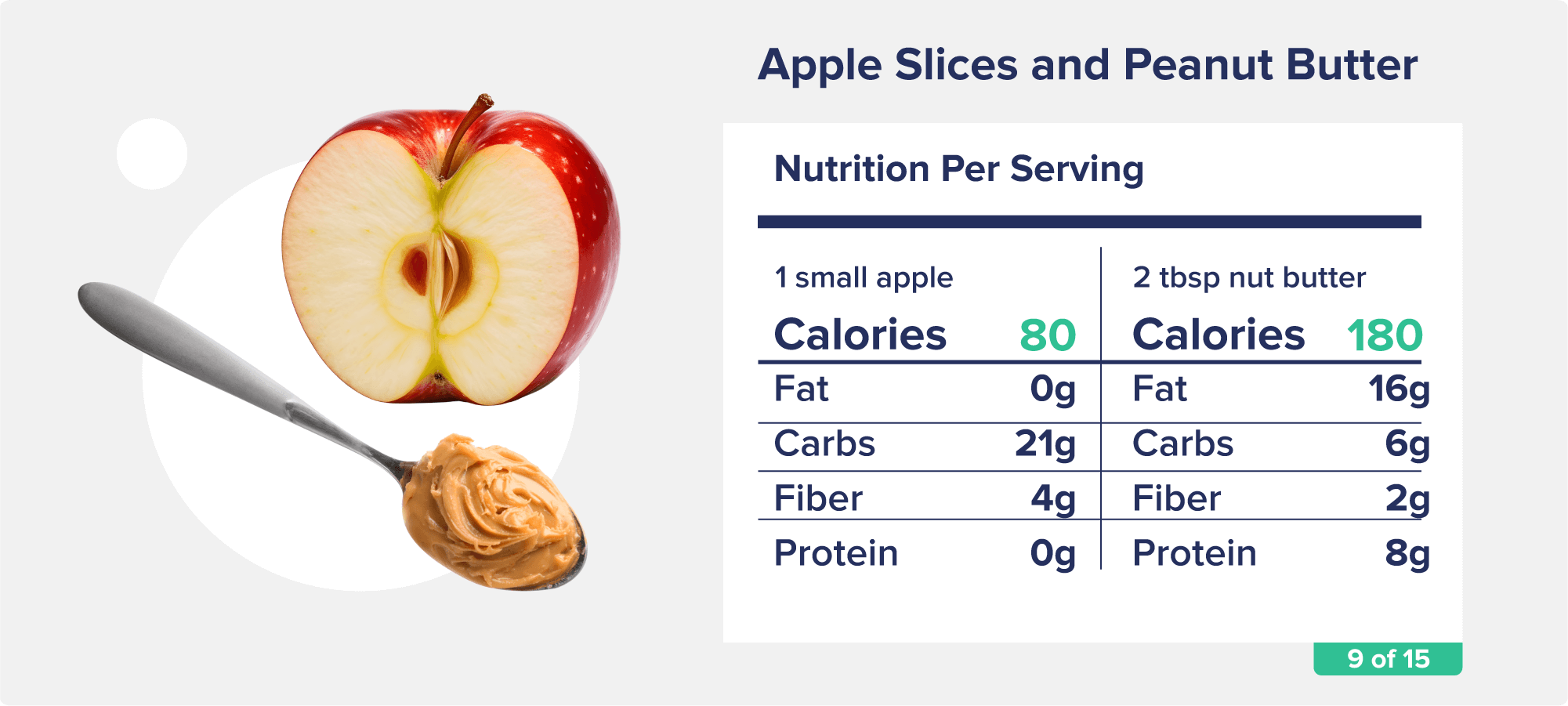
A combination loved by kids and adults alike, apples and peanut butter are a classic and simple snack.
While apples and peanut butter are a great match, you can also try almond, cashew, or macadamia nut butter for a different twist.
This snack combination is a perfect mixture of fiber, healthy fat, and protein to keep you full until your next meal.
For a bonus of both flavor and antioxidants, try adding a sprinkle of cinnamon on top of the apple slices—plus, cinnamon is thought to be beneficial for lowering blood sugar levels.
Nutrition Per Serving:
1 small apple: 80 calories, 0g fat, 21g carbs, 4g fiber, 0g protein
2 Tbsp nut butter: 180 calories, 16g fat, 6g carbs, 2g fiber, 8g protein
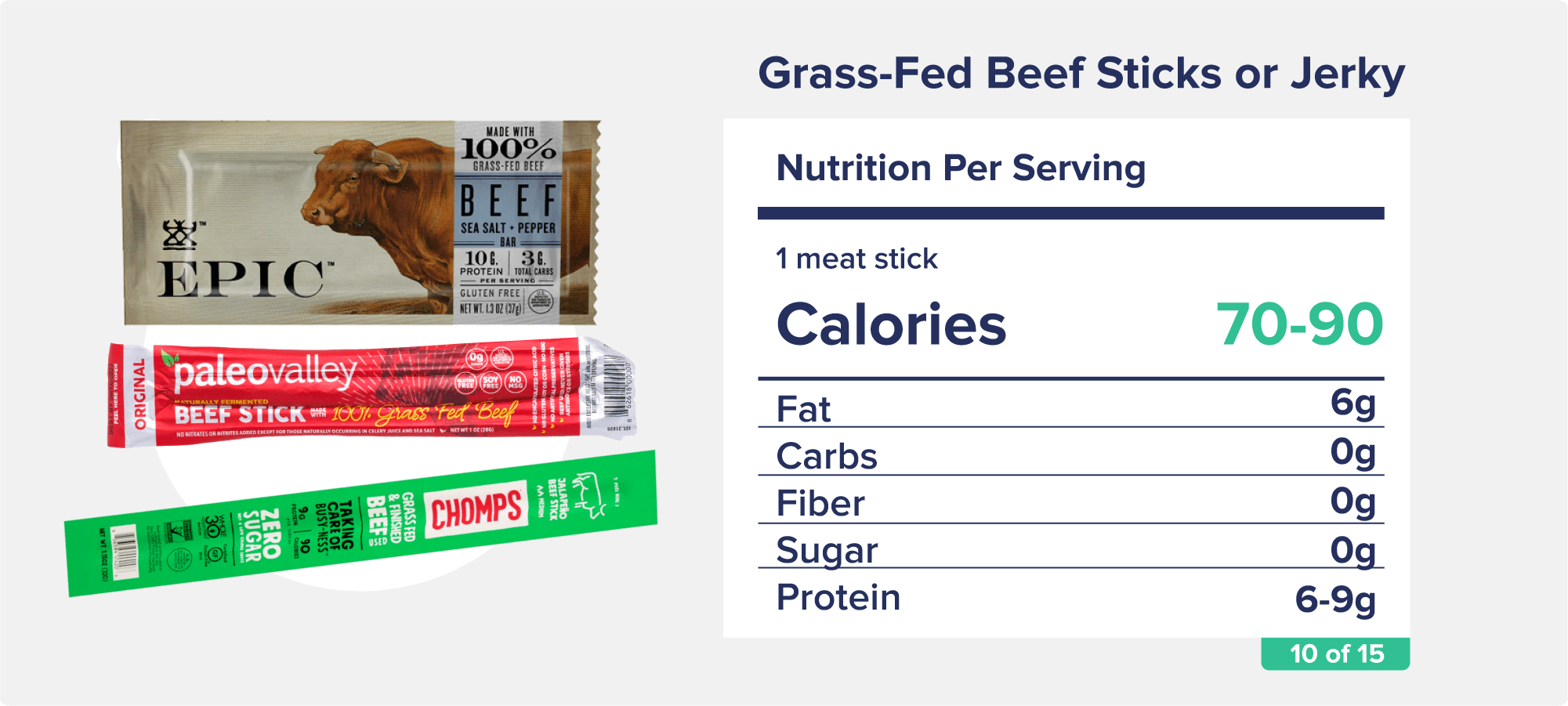
There are now many healthy brands of meat sticks or jerky—gas station Slim Jims with questionable ingredients are no longer the only option.
Healthy meat sticks or jerky typically have zero added sugar, are lower in sodium, and use meat from grass-fed or pasture-raised animals—like CHOMPS, EPIC, and Paleovalley.
Jerky and meat sticks are excellent protein sources, and most contain some healthy fat, making them great snacks for diabetics.
Nutrition Per Serving:
1 meat stick: Approximately 70-90 calories, 6g fat, 0g carbs, 0g fiber, 0g sugar, 6-9g protein
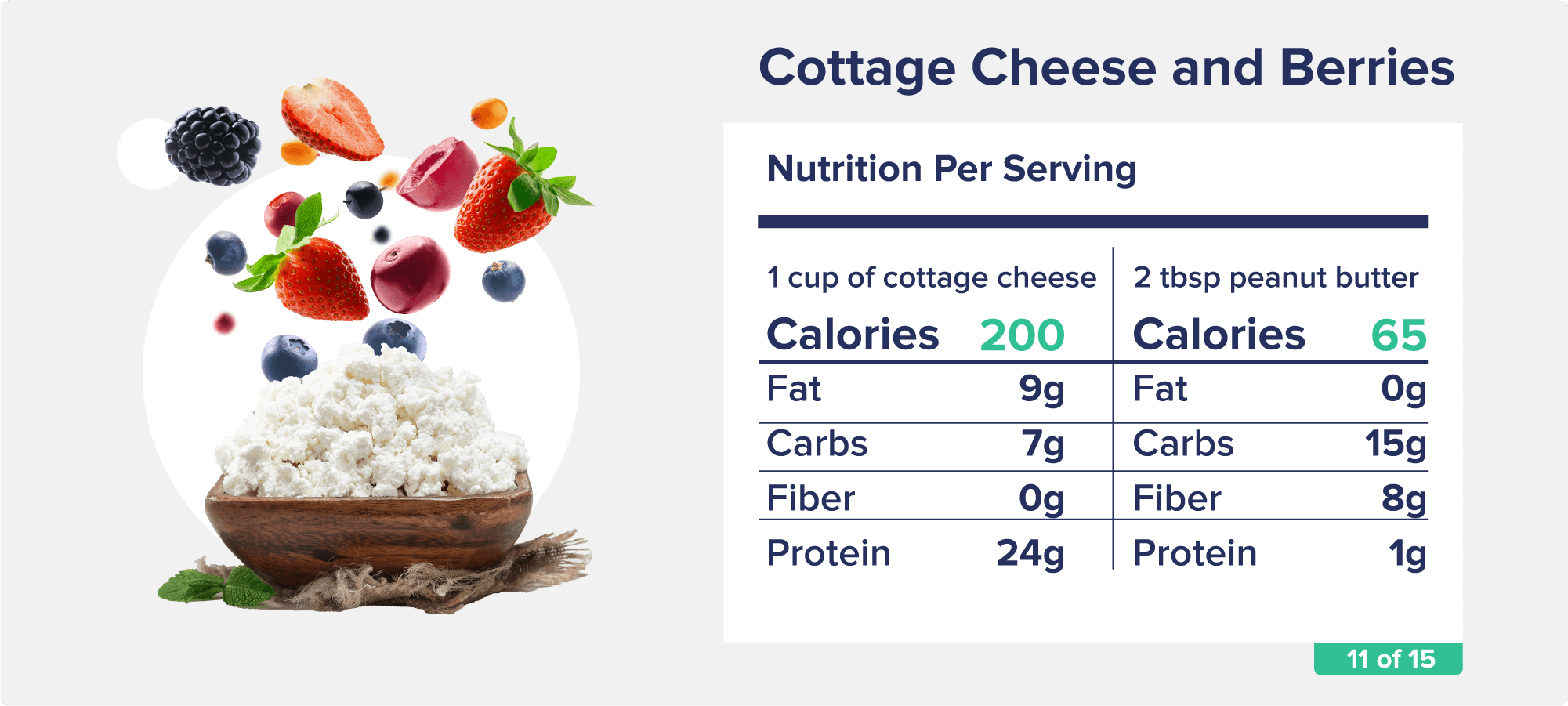
Like Greek yogurt, cottage cheese is loaded with protein—24 grams in just one cup—and is relatively low in calories, making it an excellent snack for managing blood sugar.
Although many people are divided on the taste and texture of cottage cheese, adding fruit can boost its likeability, creating a creamy and filling snack.
Cottage cheese can also be used in unique ways to mimic other forms of less-healthy dairy—like this Cottage Cheese Ice Cream Recipe.
1 cup of cottage cheese: 200 calories, 9g fat, 7g carbs, 0g fiber, 24g protein
1 cup of berries: Approximately 65 calories, 0g fat, 15g carbs, 8g fiber, 1g protein
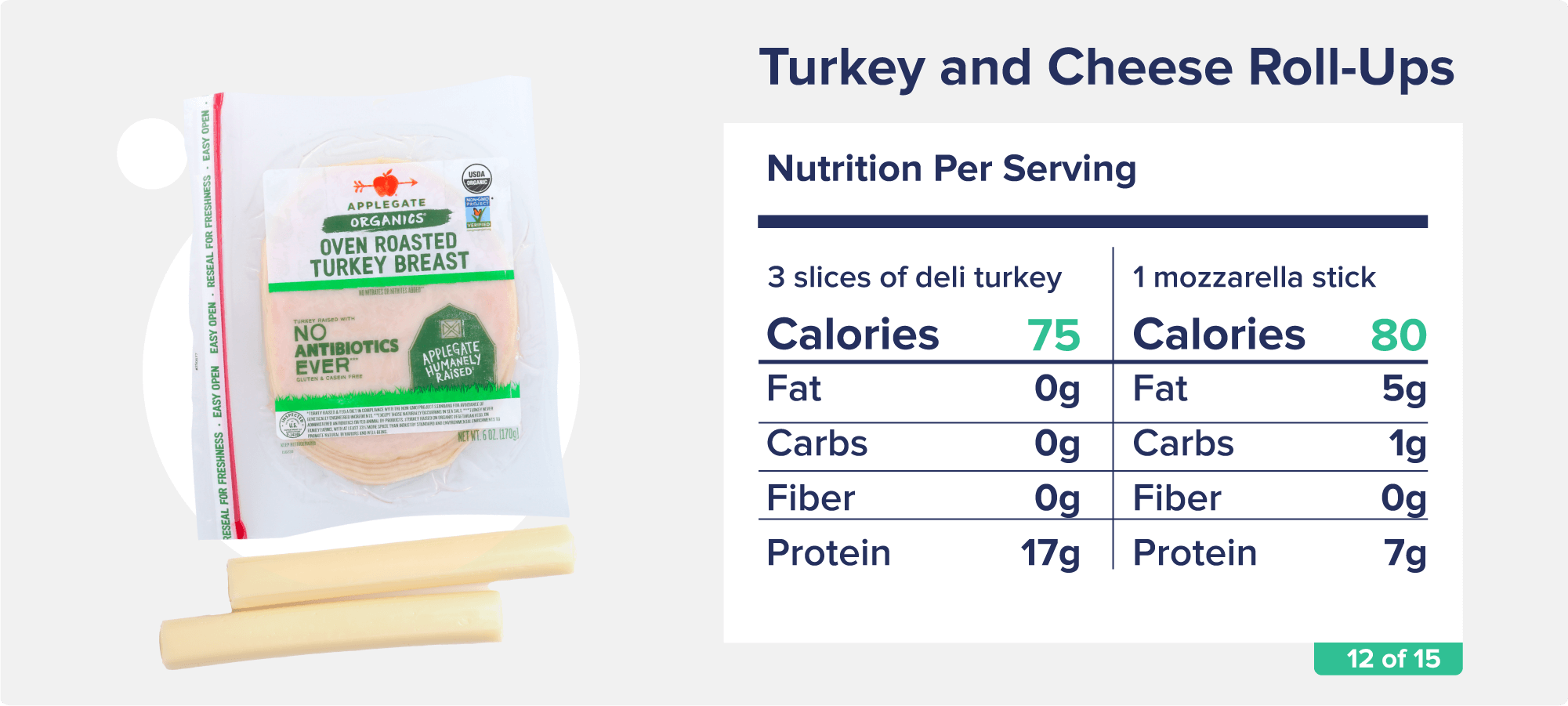
A popular snack in the keto and low-carb crowd, turkey and cheese roll-ups are a simple snack that rolls sliced deli turkey around a piece of string cheese.
With 24g of protein per snack, these roll-ups are beneficial for people with diabetes because protein does not cause blood sugar to rise when consumed in moderate amounts.
Most people prepare these roll-ups by wrapping a slice or two of turkey around a mozzarella string cheese (split in half if desired), but it can also be done with pliable sliced cheese or by spreading cream cheese on a slice of turkey and rolling it up.
Our favorite turkey brand is Applegate, as they are organic, antibiotic-free, and prioritize animal welfare.
Nutrition Per Serving:
3 slices of deli turkey: 75 calories, 0g fat, 0g carbs, 0g fiber, 17g protein
1 mozzarella string cheese: 80 calories, 5g fat, 1g carbs, 0g fiber, 7g protein
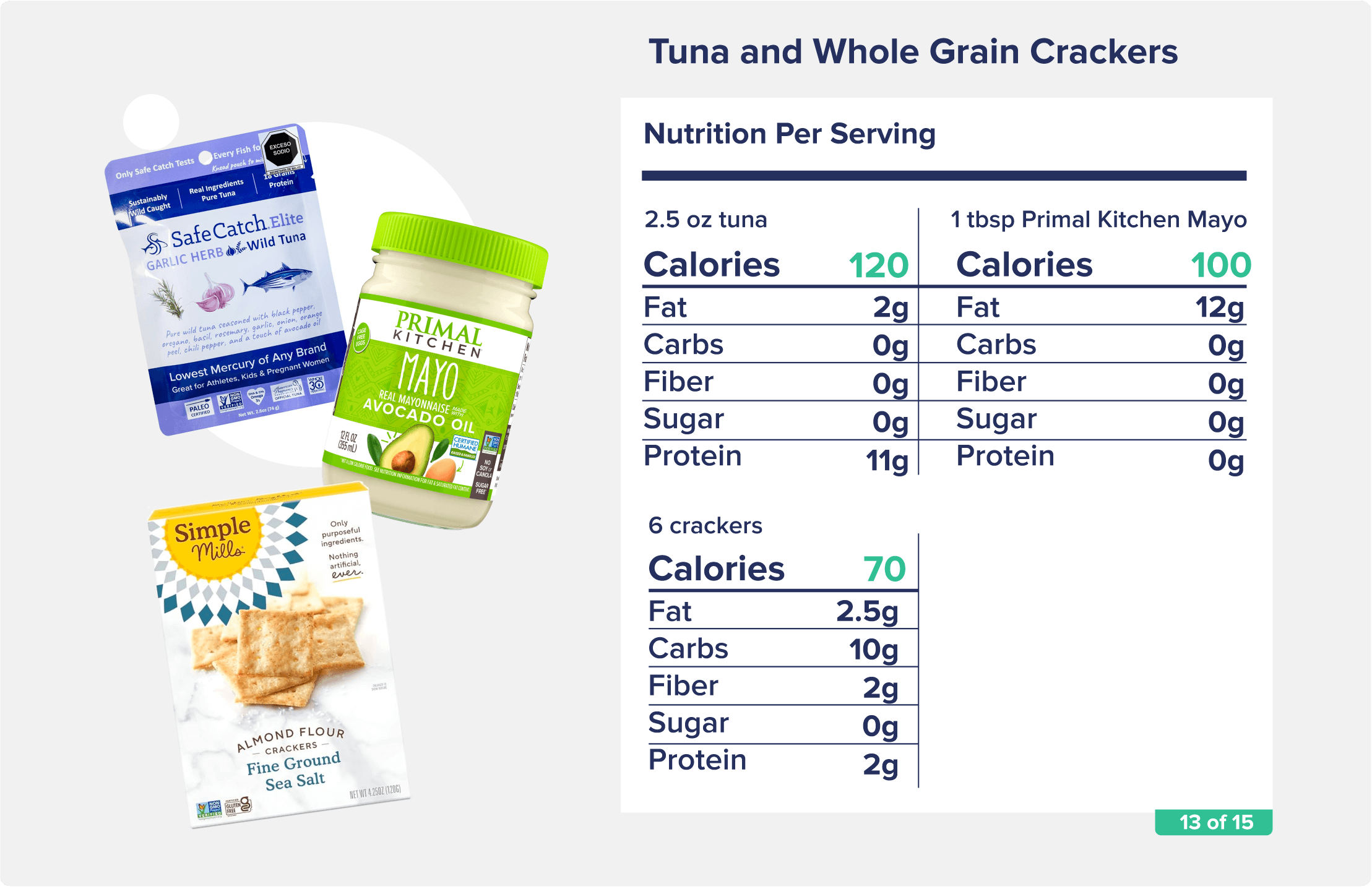
Tuna is a highly nutritious food packed with protein and healthy omega-3s—a type of fat that has been shown to stabilize blood sugar levels in people with type 2 diabetes.
Although you can eat tuna on its own, many people prefer to add condiments like mayonnaise and mustard—we love the avocado oil mayonnaise from Primal Kitchen.
Another option is purchasing pre-packaged, single-serve tuna pouches with various seasonings, like this Safe Catch Garlic Herb Wild Tuna Pouch.
Feel free to have the tuna on its own or portion it out onto 5-6 crackers made with whole grains or almond flour—like Mary’s Gone Crackers or Simple Mills Almond Flour Crackers.
Nutrition Per Serving:
2.5 oz tuna: 120 calories, 2g fat, 0g carbs, 0g sugar, 0g fiber, 11g protein
1 Tbsp Primal Kitchen mayo: 100 calories, 12g fat, 0g carbs, 0g sugar, 0g fiber, 0g protein
About 6 crackers: Approximately 70 calories, 2.5g fat, 10g carbs, 2g fiber, 0g sugar, 2g protein
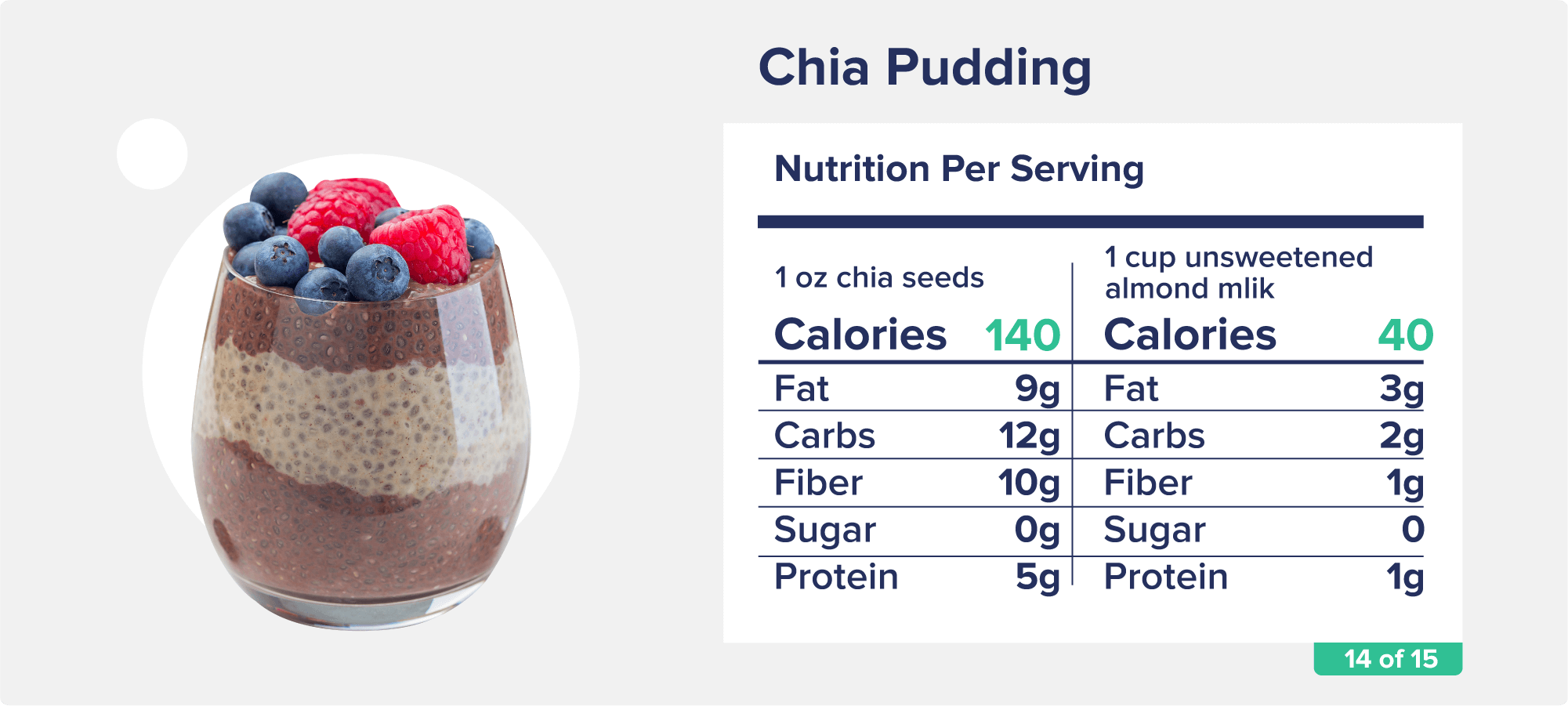
Chia pudding is a quick recipe made by soaking chia seeds in milk or nut milk, allowing the chia seeds to absorb the water and become a pudding-like texture.
Like tuna, chia seeds are rich in protein and omega-3 fats—plus, they have 10g of fiber per serving that helps to stabilize blood sugar.
If you’re a fan of chocolate (who isn’t?), try this Chocolate Chia Pudding Recipe with the modification of swapping out maple syrup for a monkfruit-based version, like from Lakanto.
Nutrition Per Serving:
1oz chia seeds: 140 calories, 9g fat, 12g carbs, 10g fiber, 0g sugar, 5g protein
1 cup unsweetened almond milk: 40 calories, 3g fat, 2g carbs, 1g fiber, 0g sugar, 1g protein
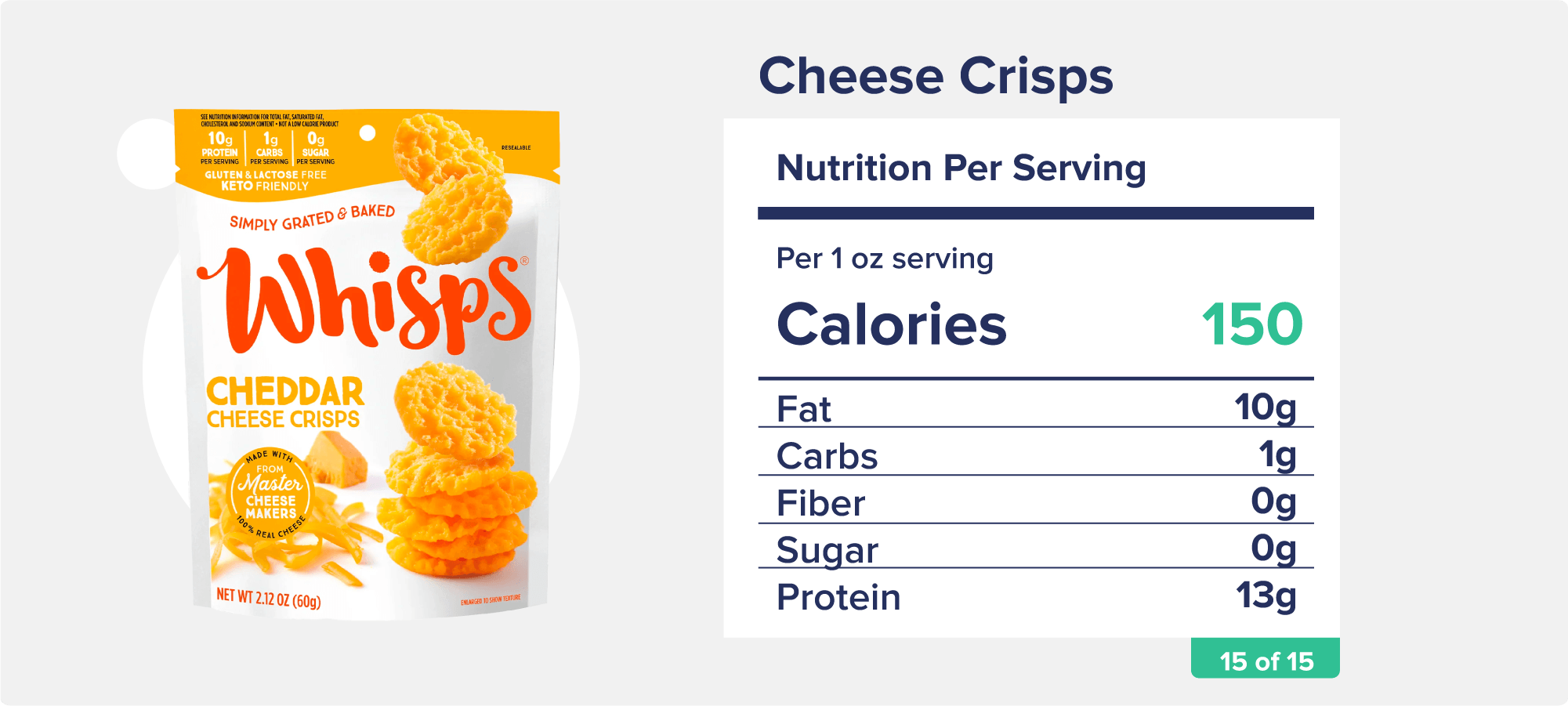
With just one ingredient and 1g of total carbs per serving, Whisps Cheese Crisps (Parmesan or Cheddar) are a low-carb, keto snack made simply of oven-baked cheese.
Plus, they have 13g of protein per serving, making them an excellent choice for a crispy and cheesy snack.
Eat them on their own or use them as a dipping vehicle for any low-sugar sauce or dip you love, like salsa, hummus, or guacamole.
Nutrition Per Serving:
Per 1oz serving: 150 calories, 10g fat, 1g carbs, 0g fiber, 0g sugar, 13g protein
Snacks to lower blood sugar or stabilize blood sugar levels are typically high in protein, fiber, or healthy fats while low in sugar.
Good examples of snacks to manage blood sugar levels include unsweetened yogurt, tuna salad, chia pudding, meat jerky, meat sticks, celery sticks and hummus, guacamole, hard-boiled eggs, and mixed nuts.
In the past, people looking for better blood sugar control should have avoided almost all packaged snacks. However, many packaged snacks nowadays are more nutritious, and there are many healthy options that people with diabetes can consume, like ALOHA protein bars, CHOMPS, EPIC, and Paleovalley meat sticks, and more.
Lower-carb chips, like cassava-based chips from Siete or Wilde Chicken Chips, are great for people with diabetes because the lower amounts of carbohydrates are beneficial for blood sugar control. These chips are better than potato chips because they have more protein, fiber, and fewer carbs. Baked potato chips could be fine in moderation, but everyone’s blood sugar responses are different.
If you want a sweet treat that still keeps blood sugar levels stable at night, try Honey Mama’s or Hu Dark Chocolate.
You can also mix cottage cheese or yogurt to increase the protein content.
People with diabetes should consider avoiding foods high in sugar–especially if they don’t have fiber or protein in them as well. People with diabetes may want to avoid dried fruit, fruit juice, candy, soda, fruit-forward smoothies, sports drinks, fried foods, ice cream, most desserts and pastries, and foods with refined carbohydrates, like white flour crackers, bread, and pasta.